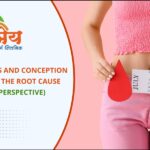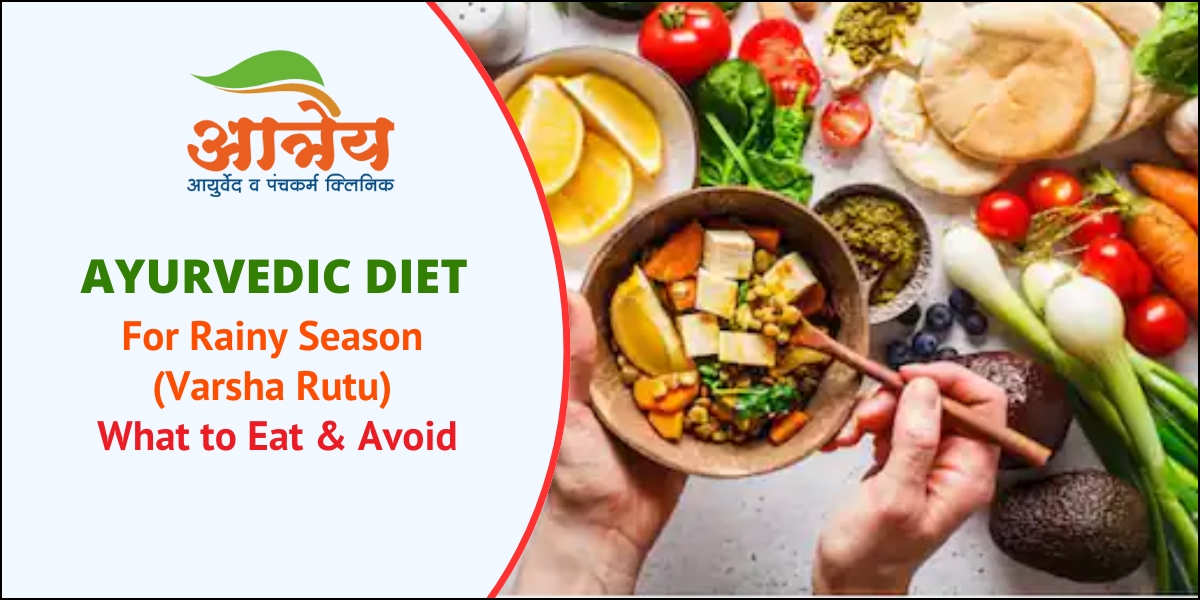Varsha Rutu — the rainy season — is a beautiful yet sensitive period for our health. In Ayurveda, this season is known to disturb Vata dosha and weaken Agni (digestive fire), increasing the risk of digestive problems, low immunity, and accumulation of Ama (toxins).
Following a season-specific diet can help maintain balance and protect your health. Here’s a complete Ayurvedic guide to what you should eat and avoid during Varsha Rutu.
Why is Diet So Important in Varsha Rutu?
- Agni becomes Mand (weak) due to humidity and coldness.
- Vata gets aggravated, causing dryness, bloating, and joint pains.
- Kapha can also accumulate if heavy, cold, or oily foods are consumed.
Thus, light, warm, easily digestible, and mildly spiced food is recommended.
Foods to Eat During the Rainy Season
- Warm, Cooked & Light Meals
- Moong dal khichdi with ghee
- Steamed rice with vegetable soup
- Lightly spiced daals
- Warm milk with turmeric or dry ginger
- Digestive Spices & Herbs
- Dry ginger (शुंठी), black pepper, cumin (jeera), ajwain
- Hing (asafoetida) for gas relief
- Rock salt (सैंधव लवण) — preferred over table salt
- Healthy Fats
- Desi ghee: strengthens Agni and reduces dryness
- Til (sesame) oil: can be used for cooking and Abhyanga
- Seasonal Vegetables
- Ridge gourd, pumpkin
- Drumstick, Bittergourd, Sponge gourd, Snake gourd.
- Digestive Buttermilk
- Thin buttermilk with roasted jeera and rock salt
- Avoid curd, but buttermilk is beneficial in moderation
Foods to Avoid in Varsha Rutu
- Cold, Raw & Heavy Foods
- Cold water, iced drinks, ice cream
- Raw salads, uncooked sprouts
- Deep-fried or too oily food
- Excessively Sweet or Sour Items
- Heavy sweets made from maida or refined sugar
- Pickles and tamarind in large quantity
- Fermented or Curd at Night
- Curd should be avoided — especially at night
- It increases Kapha and weakens digestion
- Heavy Grains & Maida
- Avoid wheat-heavy meals or maida-based products
- Prefer old rice, barley (यव), or millets in small amounts
Ayurvedic Drinks for Monsoon
- Herbal Tea: Ginger + Tulsi + Black Pepper+Lemon grass
- Jeera-Takra: Buttermilk with roasted cumin+ pinch of rock salt
Bonus Tips for Healthy Monsoon Digestion
- Use hing, ajwain, and dry ginger in daily meals
- Practice early dinner and avoid sleeping immediately after meals
- Stay physically active — even gentle yoga is helpful
- Drink boiled or purified warm water
Frequently Asked Questions (FAQ)
Q1. Can I eat curd during the rainy season?
No – Curd increases Kapha and is best avoided in Varsha Rutu. Instead, consume buttermilk during daytime meals.
Q2. Which fruits are good to eat in monsoon?
Fresh fruits like apple, pomegranate, and seasonal pears in small quantities are beneficial. Avoid sour or unripe fruits.
Q3. What is the best breakfast in monsoon?
Warm poha, upma, or moong dal chilla with herbal tea is ideal. Avoid cold milk or uncooked cereals.
Q4. Why does digestion weaken in monsoon?
Due to increased humidity, the digestive fire (Agni) becomes low, making it harder to digest even normal food.
Following a seasonal diet during Varsha Rutu can protect you from common rainy season issues like indigestion, skin allergies, joint pains, and low immunity. Ayurveda doesn’t just guide you on what to eat, but also how and when to eat it.
Stay aligned with nature and enjoy a healthy, comfortable rainy season with warm, light, and Vata-pacifying foods.
Want personalized Ayurvedic diet guidance this monsoon? Visit – Aatreya Ayurved & Panchakarma Clinic or call us at 9860007992.







